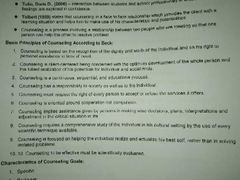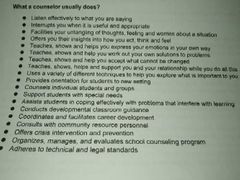![]()
![]()
![]()
Use LEFT and RIGHT arrow keys to navigate between flashcards;
Use UP and DOWN arrow keys to flip the card;
H to show hint;
A reads text to speech;
48 Cards in this Set
- Front
- Back
|
According to _______ Counseling is a helping relationships begin with a helper or counselor and a helper or Counselee. It shares ingredients to develop a satisfactory relationship. According to: |
Okun |
|
|
What are the ingredients to develop a satisfactory relationships in counseling? |
Trust Emphaty Genuineness Concern Caring attitude Respect Tolerance Acceptance Honesty Dependability |
|
|
According to____counseling is a personal relationship between professionally trained counselor and someone who aims to assist him to communicate and meet his immediate needs and problems |
Dinkmeyer (1986) |
|
|
According to____counseling is an open-ended face to face problem solving situation within which the student with professional assistance can focus and begin to solve a problem |
Glanz (1955) |
|
|
According to____counseling is interaction between students and school professionals in which thoughts and feelings are explored in confidence |
Doris Tulio (2008) |
|
|
He States that counseling is a face to face relationship which provides the client with a learning situation and helps him to make use of his character and potentials |
Tolbert (1959) |
|
|
It is a process involving a relationship between two people who are meeting so that one person can help the other to resolve problem |
Counseling |
|
|
Basic Principles of Counseling according to BECK: |

|
|
|
What are the characteristics of Counseling Goals? |
Specific Pertinent Attainable Measurable Observable |
|
|
According to Kapunan, it dad's one to make better judgements in the home, school and neighborhood or in the society where he belongs. |
Guidance |
|
|
He stated that guidance does not solve the problems for an individual,rather it helps the individual all possible means, opportunities, avenues of value to him. Thus, there is a change in behavior and increase self knowledge, self appraisal and self understanding |
Jones (1970) |
|
|
What are the four types of Counseling (by R.R. Kapunan) |
Directive or Clinical counseling Non - directive Counseling Eclectic Counseling Existential Counseling |
|
|
This type of counseling allows the counselor to give the counselee information about himself, his opportunities and his problems |
Directive or Clinical Counseling |
|
|
Steps in Directive counseling according to (Williamson) |
Analysis-collecting data, summarizing and organizing Diagnosis-Counnselor makes hypothesis or conclusion about the causes of the problem Prognosis- prediction made by the counselor on the clients development of the problem Counseling- the counselor talks about the problem. The Counselee is helped to develop insight Follow up- assist the client with new recurring problems due to "relapse" |
|
|
This is also known as client-centered counseling |
Non-directive counseling |
|
|
Steps in non-directive counseling according to (Rogers) |
Client come for help and give his reason for doing so Client describe the situation The counselor help the client feel free to talk by showing friendliness and receptive attitude. Tried to put on the situation of the client The counselor accepts, recognizes and clarifies both positive and negative feeling The period of release is followed by insights, which make growth Further insights are developed for more complete and accurate self-understanding A positive action is increased The relationship with counselor ends |
|
|
This is the merging of both directive and non-directive counseling. The counselor should be competent and proficient in incorporating this method so that a happy medium can be affected. |
Eclectic Counseling |
|
|
Steps in Eclectic Counseling as outlined by (Thorns) |
Diagnosis of the cause of maladjustment Planning the modification of the cause Securing conditions conducive to learning Stimulating the client by implied motivation to develop his resources Proper handling of any problem subsequent to adjustment |
|
|
The proponent of existentialism (Kemp, 1971) focus on the freedom of choice and the action goes with it. They view people as the author of their lives. |
Existential Counseling |
|
|
The meaning of life can be discovered in three ways: |
By doing a deal, that is, by achieving something By experiencing a value, such as work of nature, culture or love By suffering, that is, by finding a proper attitude toward unaltered faith |
|
|
The existentialist give emphasis on the ff: |

|
|
|
Qualities of Effective counselor |
Intellectual Competence- person have adequate knowledge of many different areas. Energy- being dynamic produces Student confidence and willingness to work despite being drained and physically fatigued Flexibility- Not tied to a single method of work."Which technique will work best for the student" Support- the student should feel that there is someone who respects him Good will- the counselor's motives and intentions are positive and constructive Self awareness-all our feeling and thoughts influence the way we handle certain things in counseling relationship |
|
|
What are the six roles and functions of school counselor? |
Program planning Counseling (groups & Individual) Counsulting Coordinating Student Appraisal and Assessment Professional Development |
|
|
Counselor conduct needs assessment of their particular school's strength and weaknesses. It is an important collection of data that illustrate which services are effective and which program areas need to be changed |
Program planning |
|
|
School counselors provide confidential helping relationships to help students with Educational, personal, social and career concerns. Students who have similar concerns come together to share, listen and resolve concerns. |
Counseling |
|
|
Counselors____ with parents, teachers and others to determine the most appropriate ways to help students. Counselors refer students with private or public agencies who can meet their needs on a long term basis. |
Coordinating |
|
|
Counselors use strategies to assist in this areas such as: helping students plan their educational program, interpreting test data with teachers to make appropriate decisions about academic placement |
Students Appraisal and Assessment |
|
|
Counselors must stay current in their profession through counselor's development workshops, conferences and through web-based site support |
Professional Development |
|
|
What. Counselors usually does? |

|
|
|
A positive relationship leads to the_____of clients concern. Attending behavior and influencing skills such as clarification, perception thinking or feedback facilitate the_____of the clients concern. The information gathered along the ways should lead the counselor to distinguish between the surface concern |
Problem Identification and exploration |
|
|
In problem Identification and exploration, the counselor should ensure the following actions are taken |
Define the problem Explore the problem Integrate Information |
|
|
When sufficient information relevant to the problems has been laid at and understoodz and the client has acknowledged the need to do something about the situation |
Planning for problem solving |
|
|
Planning for problem-solving includes the following steps |
Set the goals Identify and list all possible solution Explore the consequences of the suggested solutions Prioritize the solution |
|
|
After the counselor has determined that all the necessary and relevant information about the Counselee are available and clearly understood and the client manifested willingness and responsibility to handle the problem a_____ is set. |
Goal Setting |
|
|
They defined counseling as a goal oriented relationship between a professionally trained, competent counselor and an individual seeking help for the purpose of bringing about a meaningful awareness and understanding of the self, environment, improvement planning and decision making |
Gibson and Mitchell (1999) |
|
|
What are the different goals of Counseling? |
Developmental goals Preventive goals Enhancement goals Exploratory goals Reinforcement goals Remedial goals |
|
|
Attaining some of the other generic goals but because of the work or the headcount recognized by the school they are working in, many counselors often become perfunctory |
Routine interviews |
|
|
Clients are assisted in preparing for their anticipated human growth and development in the physical, personal, emotional, social, cognitive and spiritual dimension |
Development goals |
|
|
Clients are helped to avoid experiencing undesired outcomes, the goal may be_____ |
Preventive |
|
|
Clients are helped to use identify, recognize and enhance unused or underused talents, skills and abilities the goal may be_____ |
Enhancement Goals |
|
|
When clients do not believed they have an existing problem but can be benefit from examining option, testing skills, and trying activities, environments, relationship and so on. |
Exploratory goals |
|
|
When clients are already taking action for resolving their concerns or already have planned course of action when they came for counseling, the goal would be to help them recognize what they are doing, they are given feedback in light of what they wish to accomplish |
Reinforcement goals |
|
|
Whereby clients are assisted to overcome or solve an already existing concern. |
Remedial Goals |
|
|
What are human dimensional goal? |
Cognitive goals Psychological goals Physiological goals Spiritual goals |
|
|
These goals to the Development of good intra/interpersonal skills, social interaction skills, emotional control, self-esteem and the like. |
Psychological goals |
|
|
These goals refer to the Development of the intellect, and this is a concern mainly in schools. The focus would be the acquisition of the basic foundation of learning |
Cognitive goals |
|
|
These are the goals whereby clients are helped to developed basic understanding and habits for good health, such as these done by fitness and diet counselor |
Physiological goals |
|
|
Helping individuals focus on interval proccesses within them which have to do with wholeness and inner peace constitutes the spiritual goals, whether this includes the relationship with God or not |
Spiritual goals |

